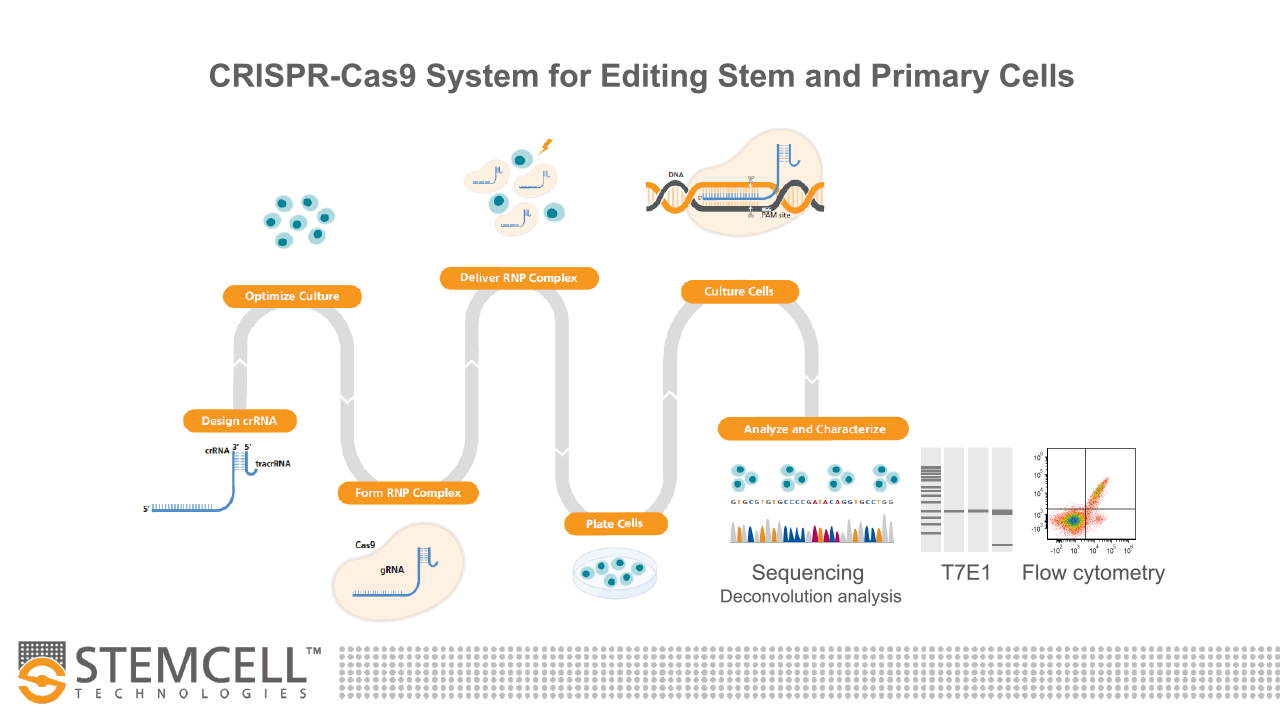Genome Editing of Pluripotent Stem Cells
Human pluripotent stem cells (hPSCs) hold great promise for the study and treatment of human disease owing to their ability to differentiate into many specialized cell types of the human body. The use of genome editing tools to generate specific DNA variants in hPSCs, by either introducing disease-specific mutations or correcting genetic aberrations, provide more accurate modeling of human disease when differentiated into human-derived tissues. Advances in genetic tools such as zinc-finger nucleases (ZFNs), transcription activator-like effector nucleases (TALENs) or most recently clustered regularly interspaced short palindromic repeat (CRISPR), have improved the ease and efficiency of genome editing in hPSCs.
Explore the resources below to support your genome editing using hPSCs.
Optimized Workflows for High-Efficiency Genome Editing in Stem and Primary Cell Types
View this webinar presentation by Dr. Ashley Watson to learn more about optimized workflows for CRISPR-Cas9 genome editing in difficult-to-manipulate cell types, including human pluripotent stem cells and primary T cells.
View Now >-
 Scaling Biomimetic Culture of Pluripotent Stem CellsHear from Dr. Maxime Feyeux, who discusses what the in vivo growth environment of pluripotent stem cells (PSCs) can teach us about in vitro culture. He summarizes some of the current challenges facing standard PSC culture technologies and shares a solution for mass producing high-quality PSCs for downstream applications.
Scaling Biomimetic Culture of Pluripotent Stem CellsHear from Dr. Maxime Feyeux, who discusses what the in vivo growth environment of pluripotent stem cells (PSCs) can teach us about in vitro culture. He summarizes some of the current challenges facing standard PSC culture technologies and shares a solution for mass producing high-quality PSCs for downstream applications. -
 Facilitating hPSC Single Cell Seeding Workflows Using CloneRā„¢2Hear from the creator of CloneRā„¢2, Adam Hirst, as he presents data for this improved single-cell cloning supplement designed to facilitate gene-editing and other workflows requiring clonal hPSC lines.
Facilitating hPSC Single Cell Seeding Workflows Using CloneRā„¢2Hear from the creator of CloneRā„¢2, Adam Hirst, as he presents data for this improved single-cell cloning supplement designed to facilitate gene-editing and other workflows requiring clonal hPSC lines. -
 Derivation and Applications of Human Pluripotent Stem CellsOverview of the derivation of human embryonic stem cells (hESCs) and induced pluripotent stem cells (iPSCs)
Derivation and Applications of Human Pluripotent Stem CellsOverview of the derivation of human embryonic stem cells (hESCs) and induced pluripotent stem cells (iPSCs) -
 CRISPR-Cas9 Genome Editing of Human Intestinal OrganoidsCRISPR-Cas9 genome editing of intestinal organoids cultured in IntestiCultā„¢ Organoid Growth Medium (Human) (Catalog #06010) using the ArciTectā„¢ CRISPR-Cas9 ribonucleoprotein (RNP)-based system and ŗŚĮĻ³Ō¹Ļ's Guide RNA Design Tool
CRISPR-Cas9 Genome Editing of Human Intestinal OrganoidsCRISPR-Cas9 genome editing of intestinal organoids cultured in IntestiCultā„¢ Organoid Growth Medium (Human) (Catalog #06010) using the ArciTectā„¢ CRISPR-Cas9 ribonucleoprotein (RNP)-based system and ŗŚĮĻ³Ō¹Ļ's Guide RNA Design Tool









